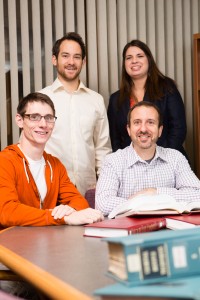
Three third-year law students from Case Western Reserve University’s Milton A. Kramer Law Clinic are wrapped up in a rare opportunity to argue a case before the Ohio Supreme Court.
Yelena Grinberg, Patrick Haney and Joshuah Lisk drafted a petition to the court in November, asking the court to take their client’s case. This month, the court accepted their case for full briefing and oral argument.
A case before the Ohio Supreme Court is a first for the Kramer Law Clinic, which provides free legal counsel on an array of cases for clients who otherwise couldn’t afford a lawyer.
“Getting a case into the Supreme Court—and then briefing and arguing it—is something that relatively few practicing attorneys get to do,” said Andrew S. Pollis, assistant law professor and the students’ faculty supervisor in the Civil Litigation Clinic. “For law students to accomplish this before they even graduate is, to say the least, remarkable.”
For the rest of this semester, the students will work on the merit brief, which presents their case in writing. The arguments in the merit brief will serve as the focus of questions the justices will pose at the oral argument.
The students hope to have their brief submitted within the next two months. The opposing side can offer its own brief in response, and the students would have a chance to prepare a final reply. The oral argument is likely to happen next fall—after the students’ graduation—and a decision some months later.
But the three clinic students say they want to stick with the case, if they can, even after graduation. For now, Grinberg, Haney and Lisk say the experiential learning in civil procedure at the top of Ohio’s judicial system has been a special experience.
“I think it’s a really great way to end our law school experience,” Grinberg said.
Grinberg, Haney and Lisk comprise the fifth team of student lawyers—dubbed “certified legal interns” under the Supreme Court’s student-practice rule—involved in the case. Four years ago, the clinic began representing the client in a home-repair dispute. The defendant failed to answer written discovery requests, the main way lawyers gather information to support or defend their case in civil litigation.
Although the underlying case is complex, the issue before the Supreme Court is fairly straightforward. It involves the right to collect attorney fees—specifically, whether a judge can award fees to lawyers who serve pro bono (usually for free as a public service for clients who can’t afford to hire a lawyer) when the opposition fails to meet its discovery obligations. The Kramer Law Clinic’s case in Cuyahoga County Common Pleas Court resulted in an attorney-fee award of $1,000.
The defendant appealed the trial-court ruling to the Eighth Ohio District Court of Appeals. Students Ruchi Asher, Emily Grannis and Jim Thomas, who all graduated last May, argued that appeal. A three-judge panel ruled 2-1 to overturn the trial court’s fee award. The appellate court wrote that it reversed the award “reluctantly,” but was constrained to follow a prior Ohio Supreme Court decision holding that lawyers cannot recover attorney fees when their clients are not actually obligated to pay them.
This year’s team of students responded by filing a jurisdictional petition in the Ohio Supreme Court, asking the high court to accept the case for full briefing and oral argument, and to consider overruling the prior decision.
Not only did the students write the petition; they also secured supporting briefs from key sectors of the legal profession, including several private law firms, legal-services organizations, the plaintiffs’ bar and the Ohio Attorney General. And, on March 12, the three students found out the majority of justices voted to accept it.
“The case could have a wide-ranging effect on legal representation in Ohio,” Pollis said. Haney noted that a ruling in their client’s favor “would enhance low-income individuals’ access to the legal system.”
Now that the case is in the Supreme Court, it requires the students to work on the merit brief while juggling their other academic demands and preparing for graduation and the bar exam.
“That brief will give us an opportunity to do even more research and argue the case more extensively,” Grinberg said.
